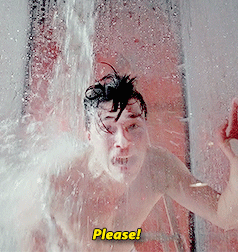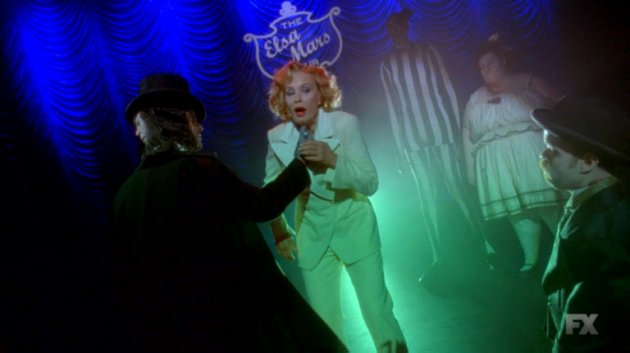a belated goodbye
 Here's how you know a show has lost you: when you forget that you didn't finish watching it. I was faithfully tuning into American Horror Story this past season, and just like every season, I lost interest without realizing I'd lost interest before the finale. It's rather like a tire slowly deflating rather than blowing flat with that horrible disorienting noise.
Here's how you know a show has lost you: when you forget that you didn't finish watching it. I was faithfully tuning into American Horror Story this past season, and just like every season, I lost interest without realizing I'd lost interest before the finale. It's rather like a tire slowly deflating rather than blowing flat with that horrible disorienting noise.
In the case of Freakshow my attentions were interrupted by Oscar nominations and then awards shows and then Sundance. When I got done with all of that it took me a full two weeks to remember that Freakshow was still sitting there on the DVR waiting. In many ways Freakshow was the best looking season of AHS with the most promising first chapters. But it suffers as Vulture correctly observed from a horrifically ill advised finale, particularly its entire final sequence on Elsa's post-Freakshow career. That was the worst kind of television writing, really: nonsensical, unearned, aggravatingly ignorant of what came before it and beholden to an agenda (Jessica Lange Worship) that the text can't support or in this case actively fought against for an entire season.
Even Dandy Mott (the brilliant Finn Wittrock), by far Season's 4 best and most successful character invention (Sarah Paulson's Bette & Dott could have been but the show lost interest in her... as it does... to cede the spotlight to Lange each year) was defeated at the end. And I don't mean literally though he was that, too. His final murder spree was less tense and cleverly mounted than rotely grim and nihilistic. Bang. Bang. Bang.
Will I tune in to Season 5 with an amnesiac's ignorance of this show's absurdly predictable patterns? Each season starts with an intriguing premise, populates it with fun actresses, and then soon derails narratively redeemed only by occasionally brilliant acting and batshit crazy unmissable moments. Ultimately it fails because ithas no discipline around the two things that TV arguably does best: long form character arcs and narrative nomentum.
I probably will tune in again. But why?
I never finished Murder House (quit 1/3rd through) or Asylum (quit 3/4th through) and neither time did I regret it. I did finish Coven, my favorite season. But it was not my favorite because it was "good." In fact that season got progressively worse as it went -- as nearly all seasons seem to. But I loved it because it was a) about witches and b) gave great Angela Bassett and Frances Conroy and Kathy Bates in (mostly) that order A-C-T-I-N-G in all caps on their every line in their every scene and all three were hilarious and c) the Stevie Nicks jokes were damn fun.
Perhaps the TV anthology, which this series revitalized, is the perfect form for modern television? Much has been written about TV's new golden age and while there is indisputably great work being done on television, there's also a LOT of audience generosity that's helping TV shows be perceived as great even when they aren't. TV is easy, convenient, and also easy to forgive when it fails. If people had the patience for movies that they do with television, imagine how much more subtle movies could be and which films would suddenly be big hits. When movies go off the rails the audience spreads bad word of mouth. When TV shows go off the rails, the audience says "maybe the next episode / next season will be better? I'll give it three or four more hours to see..."
With anthologies and cable series the limited length also promotes amnesia about how frustrating some shows routinely are. By the time American Horrror Story Season 5 arrives nearly everyone who bitched about Freakshow (including probably me) will be excited about being disappointed all over again. Anthologies may well be TV's version of the big studio's "Reboots". The creative teams always gets to hit the reset button and the audience always gets to tune in again, with naive hope that this time things will be different, ready to forgive and devote precious hours again.
